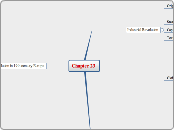Chapter 23
Industrial Revolution
Innovations in the 3 primary areas
New means of harnessing energy
New inventions
New ways of of more productively organizing human labor
Advances
Fossil fuels
Coal
Steam engines
Mechanized systems
Transportation
Communications
Origins
From agriculture to industry
People used to know everybody
Joseph Banks
Herzen
Steam Engine
James Watt
Capitalism
Wealth of Nations by Adam Smith
Division of labor
Textile Industry
From hand made to mechanized
Global Dimensions
Market industrial capitalism
Transportation & communication
Railroads
efficient
less expensive
heavy goods
People
Steamship
Suez Canal
Telegraph
Militar tactical advantage
Indian deindustrialization
Raw materials are faster
Similar in Northamerica and Eqypt
Marx and Darwin
Marx
Dissection of capitalism
Explanation of the inevitable socialist revolution
Hegel
Thesis-antithesis--synthesis
French rev
Bourgesie
Capitalism
overproduction
Crysis
Owners vs proletariat
The socialist International
No nationalism
Solidarity between proletariats
Darwin
Natural selection drives evolution
Natural history
Reform and Revolution in 19th century Europe
Herzen
Liberalism
Open-mind accept need for social and political reform
Freedom
Conscience
Trade
Protection of property rights
Limitation to government and church
Britain
Socialism
France and Germany
Collectivization of property and realization of social equality
Romanticism
Germany
Emotional intensity and authenticity over racionalism
Nationalism
Develop
Culture and history
Bring together or separate in groups
Victorian Britain
Dominated by
Conservatives
Change
French Rev. Excesses
Tariffs
Unemployment in returning soldiers
low wages
Unhealthy places
Poor and middle class
No vote
Church
assert spiritual
Charitable organizations
Cure bad
Utilitarianism
Judge by utility
Studies
Raise wages
Take away old restrictions
More profitability
Reform Bill of 1832
distribute seats in parliament with the growth of cities
Reduce property requirements
Consequences
Free trade
Mill
Individual freedom
France
Reject Bourbons
Louis Philippe
Bourgeois King
Abdicate
Louis Blanc
Private property inefficient
Cooperate
Famous among poor and unemployed
Louis Napoleon
Emperor, authoritarian
Respected the rule of law and basic civil liberties
Appealed to French nationalism
The Habsburg Monarchy
Monarchy
Protests inspired by french rev
Reduce their possesions
The Unification of Italy
Based on
Language
culture
History
North
Industrial
South
Catholic conservatives
Garibaldi
Completed unification
Monarchy
Military capacities
Germany
Revolutionary impulse
Unified Germany
Frankfurt Assembly
Creation of a constitution
Bismarck
Military victories
Nationalism
Faster growing econmy
